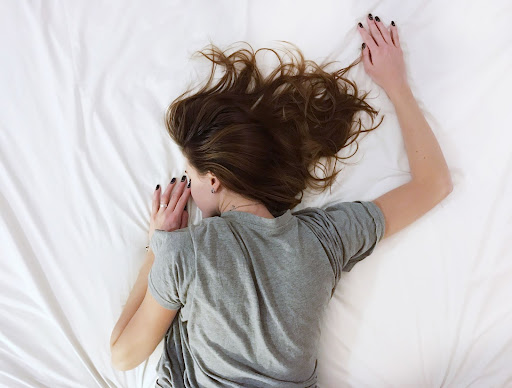Not being able to fall asleep can leave you feeling exhausted and impact your productivity and ability to focus on important tasks. Tossing at turning at night, trying to get comfortable, or lowering the thermostat never seems to help you get to sleep, and neither do over-the-counter sleep aids. While there may be a medical reason for your tossing and turning, it could also result from stress or racing thoughts. Everyone has difficulty falling asleep at one point or another, but there are ways you can help yourself fall asleep and stay asleep for a full eight hours every night.
Vitamins and supplements can help keep your body and mind healthy and some claim to make it easier to fall asleep. You get vitamins through foods and drinks, but most people aren’t getting enough from their diet. This article will discuss whether or not vitamins can help you sleep better and which vitamins might do the trick.
Do Vitamins Help With Sleep?

While vitamins can help you manage your stress levels, there’s no conclusive evidence that vitamins can help treat insomnia or sleep problems. Of course, you might find some natural remedies in vitamins, such as melatonin, magnesium, and valerian root, which may promote relaxation and improve sleep. Primarily, these supplements can help you relax after a long day, which may help you fall asleep faster, but everyone will experience their effects differently. For example, some people swear by chamomile tea before bed, while others just like the taste and don’t feel any relaxation effects.
Additionally, a healthy diet has been shown to help people sleep better, so it’s possible the vitamins in your food contribute to your ability to fall asleep, but more research is needed.
Some studies and research have shown how vitamin deficiencies can negatively affect sleep. For example, vitamin D deficiency has been linked to sleep disorders like insomnia, but more research is needed to verify these claims. While vitamin D may play a role in sleep regulation, it may not be the only contributing factor. Another example of where a vitamin deficiency can impact sleep is iron, which can cause restless leg syndrome and interrupt regular sleep.
Nevertheless, if you want to take vitamins for sleep, there’s no harm in trying. After all, vitamins are healthy and can help you feel more energized throughout the day, which might help you expend more energy so you can fall asleep faster at night. Supplementing your diet with vitamins may be able to improve sleep disorders, but it might not help everyone.
Also, because vitamins can help improve your health, they may help your body repair itself more efficiently. Your bones, muscles, skin, and all of your organs depend on vitamins and minerals to heal and help you manage pain, which can disrupt sleep.
Vitamins That May Improve Sleep Quality
How you take care of your body can impact your sleep, but there’s simply not enough evidence to know how different nutrients impact sleep quality. However, a few of the most well-known vitamins might play a role in sleep. In general, having a healthy diet and taking care of your body and mind can help improve your entire life and may significantly improve sleep problems. Here are some vitamins that may enhance the quality of sleep.
Vitamin D
Vitamin D is great for your bones, but it can also help you feel more invigorated throughout the day as it regulates mood and supports your immune system. In addition, vitamin D deficiency may impact how well you can sleep and how much sleep you get. For example, studies have found links between vitamin D deficiency and poor sleep quality, especially for seniors.
Most Americans lack vitamin D, especially those who live in places that don’t get a lot of sunlight during the winter, which can result in poor sleep quality. That being said, many people feel more tired and sleep more during the winter when there’s less sun and become more energized during the spring when there’s more sun.
However, some research suggests that vitamin D deficiency may be related to sleep apnea. Additionally, vitamin D may improve sleep by regulating your internal circadian rhythm since light and darkness regulate it. As you already know, sunlight is the best source of vitamin D, but if you’re not getting enough sun, you’re probably deficient. Many people choose to take vitamin D supplements during the winter since they’re not getting enough sunlight naturally.
Vitamin E
Vitamin E is an antioxidant responsible for maintaining cell function while protecting cells from damage, so it’s a popular skincare ingredient. Because it’s an antioxidant, vitamin E may be able to improve sleep problems. Your brain processes memories and new information during sleep, and sleep deprivation could mean you are vitamin E deficient. Additionally, individuals with sleep apnea typically have vitamin E deficiencies, which may mean that vitamin deficiency is the cause or they’re somehow related.
You can get more vitamin E in your diet by eating nuts and seeds or taking supplements.
Vitamin C
Vitamin C is another common skincare product, and it’s typically associated with improving immunity. However, it’s also responsible for cardiovascular health and helping your body produce collagen. Another antioxidant, vitamin C may improve sleep apnea by improving interrupted breathing. Additionally, it can help prevent cardiovascular disease, which might cause sleep problems.
Low vitamin C levels have been correlated with shorter periods of sleep and sleep disturbances. You can get more vitamin C in your diet by eating citrus fruits like oranges.
Iron
As we’ve already mentioned, iron deficiencies may cause restless leg syndrome, which can disrupt sleep. Low iron can also come with symptoms such as increased heart rate, making it difficult to fall asleep and stay asleep. Additionally, iron deficiencies may increase feelings of anxiety because they increase the heart rate. You can get more iron in your diet by eating more red meat and spinach.
B Vitamins
People deficient in B vitamins may have insomnia or sleep-related problems. B-vitamins are known to help increase energy levels and clarity while reducing anxiety. In particular, B12 can help your body create energy to feel more awake during the day and expend more energy. If you have too much energy when trying to go to bed, you might be kept up with your thoughts. Taking B vitamins can help you use up more energy throughout the day so both your body and mind are tired enough to fall asleep.
Final Thoughts
With a lack of research, there’s no way to know whether taking vitamins can improve your sleep or not. However, they can enhance your health and wellness, improving your sleep quality and mental and physical health.
Marné Amoguis

Marné Amoguis holds a B.A. in International Business from UC San Diego. She is a contributing writer at 365businesstips.com where she loves sharing her passion for digital marketing. Outside of writing, she loves traveling, playing music, and hiking.


